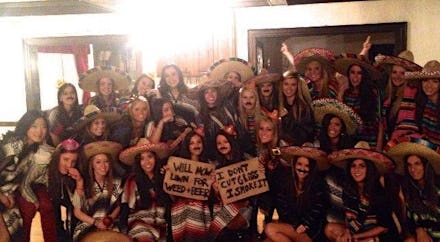Be Respectful This Halloween, Not 'Politically Correct'

Last week, Dean of Students Christina Gonzalez at the University of Colorado Boulder caused a mini-media stir after she sent out a campus-wide memo asking students to refrain from dressing up as racial and ethnic stereotypes for Halloween. The memo encouraged students to "consider the impact" that their costumes may have towards other students, noting that the campus community has been negatively affected by students wearing culturally insensitive costumes in the past.
Media responses have been swift and reactionary, especially among more conservative outlets: Fox News was quick to call the story "outrageous," citing it as another incident of the "PC Police" "cracking down" on offensive Halloween costumes. UK newspaper the Telegraph went so far as to claim that the university had banned offensive costumes (it hadn't). Though it's up for debate whether Gonzalez's memo was the best way to encourage cultural sensitivity, it's clear that the media backlash to this event has been over-exaggerated. Critics immediately fell upon the familiar charge of political correctness as limiting freedom of expression. However, in the context of such glaringly offensive costumes, political correctness isn't — and shouldn't — be the point. Respect should be.
Over the past few years, Halloween seems to have accidentally acquired a new association: October 31 isn't just a night of trick-or-treats and horror films, it's also a showcase for offensive and demeaning costumes. This year, we've already seen Julianne Hough don blackface in a misguided tribute to Orange is the New Black character Crazy Eyes. More astoundingly, two white men in Florida decided that it was acceptable to pair up as Trayvon Martin and George Zimmerman for a party. Though the outcry fades fast (and often quickly turns to parody), the debate over Halloween costumes is still worth much discussion. It proves that cultural appropriation, as one PolicyMic pundit put it, remains alive and well — much of it fed by the media. On college campuses, it demonstrates the sad ironies of students choosing to wear insensitive costumes in an environment where diversity and awareness are supposed to be celebrated. Furthermore, it points to the difficult balance of encouraging racial sensitivity while also maintaining the right to freedom of expression. How do you ask students not to offend, while not encroaching on their right to free speech?
The careful wording of Gonzalez's memo attests to just how delicately these requests are framed. The statement acknowledges that students may not always have the intention to be disrespectful when they dress up in culturally specific ways. It even implies, strangely enough, that the responsibility may be found in stores that sell stereotypical and offensive costumes. Nowhere does it mention racism. Nowhere, either, does it do more than encourage students to consider the impact of their costumes. In an article that clearly snubs Fox News' hyperbole, Katie McDonough at Salon rightly points out that the memo is, in fact, fairly innocuous: at no point does Gonzales state that there will be disciplinary action taken against students who dress up in these costumes. At the University of Minnesota, the Office of Student Affairs took a similar approach, requesting that students "take care" in selecting their costumes, but noting no disciplinary action.
However, careful as the wording gets, it's hard to ignore the disconnect between stating that freedom of expression is valued, while strongly urging your students not to express themselves in a certain way. It's the kind of problem that critics claim is demonstrative of an overemphasis on political correctness at universities. Instead of being bastions of academic and intellectual freedom, universities can instead become engines of indoctrination, where ideological biases and political leanings infiltrate administrations, departments, and classrooms (Stanley Fish provides a succinct list of these concerns in his review of the documentary Indoctrinate U). At times, politeness is precisely the problem: in the desire and, perhaps, pressure, not to offend, speech is stifled and even censored. And certainly, we've seen numerous disputes arise over the exercise of individual expression at universities; organizations like the Foundation for Individual Rights in Education (FIRE) are founded solely on protecting those rights (they also weighed in on the costume debate, noting that the emails from CU Boulder and the University of Minnesota-Twin Cities did not violate student rights, but were still "troublesome from a free speech standpoint").
However, political correctness is largely irrelevant when it comes to offensive Halloween costumes. Lumping this problem with the larger, much-contested debate over political correctness is merely a way of sidestepping the actual issue: the costumes and the ignorance, lack of respect, and cultural appropriation evident in them. Turning this issue into one about free speech is a way of ignoring and failing to address the fact that these costumes openly mock a culture, as a student group at Ohio State University, Students Teaching About Racism in Society (STARS), points out. Furthermore, campaigns like those of STARS hardly mention political correctness as a goal: rather, what these organizations want is to facilitate understanding, awareness, and a genuine respect for other ethnic groups. One student at the University of Wisconsin-Madison Multicultural Student Center came up with a thoughtful guide to understanding what, exactly, makes a costume racist. The objective is respect and understanding. Political correctness is hardly the point.
While it might be easy to dismiss insensitive costumes as purely jest or part of the antics of Halloween, they're worth criticizing when they continue to be trotted out each year. Halloween isn't an excuse to openly mock a culture, nor should it act as an exception in which these kinds of slurs are allowed. We already see insensitive stereotypes perpetuated in the media every day — we could do better with our creativity, and dress up as something else.